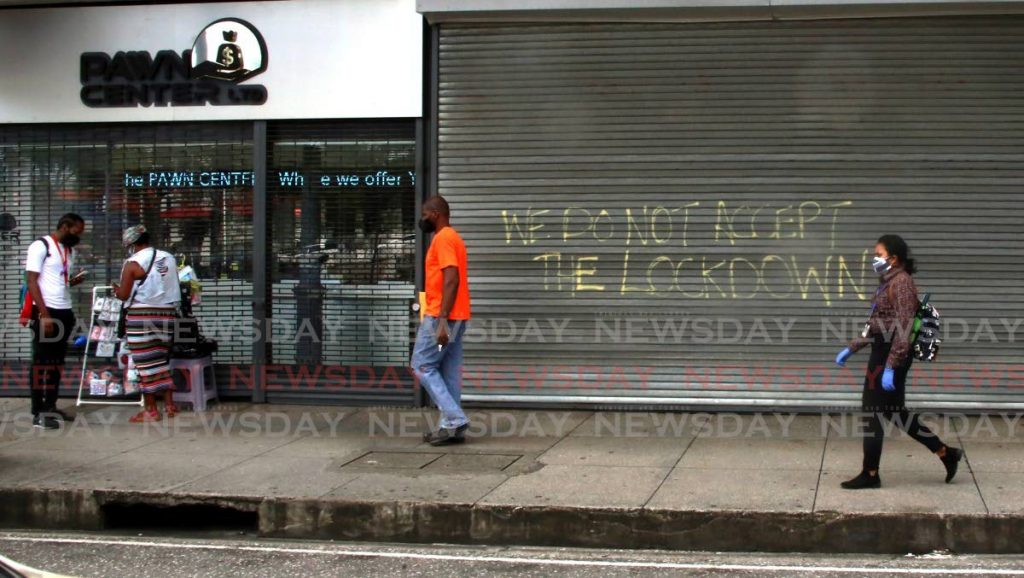The most vulnerable are worst affected by covid19 restrictions

Things will never be the same, although there is a cyclical pattern to history. Poet William Butler Yeats wrote many years ago, at a time sadly similar to ours:
Turning and turning in the widening gyre
The falcon cannot hear the falconer;
Things fall apart; the centre cannot hold;
Mere anarchy is loosed upon the world…
The best lack all conviction, while the worst
Are full of passionate intensity.
Yeats was Irish, though he didn't live at the time of "The Troubles," which in some ways were not unlike "The Troubles" in TT at present. Violence was as daily an occurrence as murder is here, which is how we say "anarchy being loosed upon the world." By "the Falcon" he meant the people of Ireland, suffering as the poorest in TT do during the pandemic, as what goes round goes round. Another lockdown. "Zessers" and "wessers" continue their selfish partying, believing "with passionate intensity" that God is a Trini and it won't happen to them.
And who suffers the consequences most?
Although few would deny it, the new restrictions on employment are on the poorest: the vendors of provisions and food on the side of the road. They were the ones punished; the large food places, when in-house dining was restricted, promptly moved tables, chairs and portable stoves into the open air, putting Big Business in competition with the traditional small entrepreneurs who stayed open late to serve the late-nighters.
Similarly, back in 1939 government placed early lockdown restrictions on the poorest and most vulnerable self-employed entrepreneurs, mainly food providers, of provisions, small cook shops and home-grown goods and services that were staying open late and “competing unfairly” with big business.
As I listened to the added restrictions last week I realised it is mainly, as the ILO has pointed out in its reports in country after country, year after year, women with small children to support that suffer the most.
Why, for example, are the caregivers to the elderly (outside of those in the notorious and often noxiously unsanitary “elderly care homes”), and those who look after small children while their essentially working parents go to work or are disciplined for excessive absenteeism, now told not to go to work?
They are frequently single parents themselves. They work, as women in that position so often do, at minimum wages. They live from weekly wage to weekly wage, and have no savings to fall back on.
Does anyone think these things through? Or do the decision-makers who announced one afternoon at 2 pm that their organisations will be closed for three weeks as of midnight the next day, and threatened to arrest those mothers who rush to buy milk, peas and rice, really think that these workers can survive on government promises of food cards? Can they, when they never managed to organise the support promised to the poorest and least resourced and unregistered by NIB the last time in three months, much less in three days before the new lockdown?
Yes, certainly things will never be the same.
One of them will be the requirements demanded of local franchise suppliers of foreign goods and services. They are now, by international WTO rules, being required to meet certain requirements. I researched several this week and bring one typical list of 13 here for aspiring employers:
1. Legal and ethical standards that will apply to all vendors and sub-contractors as well
2. Discrimination against any worker including migrant workers, forbidden
3. Child labour forbidden to under-18s
4. Written contracts for all employees
5. Basic-needs earnings
6. All labour laws, including minimum wages, hours of work and and overtime, obeyed
7. Forced labour forbidden
8. Freedom of association, including the right to bargain collectively
9. Safe, clean and healthy environment.
10. Banned substances banned
11. Animal welfare protected
12. Compliance with community environmental concerns
13. Import and regulations and requirements adhered to.
As TT will be expected to adhere to the World Trade Organisation standards in the future, just as it is to the World Health Organization’s, it may be useful for any organisation that intends to import goods or services to take a look online and see what they will be in for.


Comments
"The most vulnerable are worst affected by covid19 restrictions"